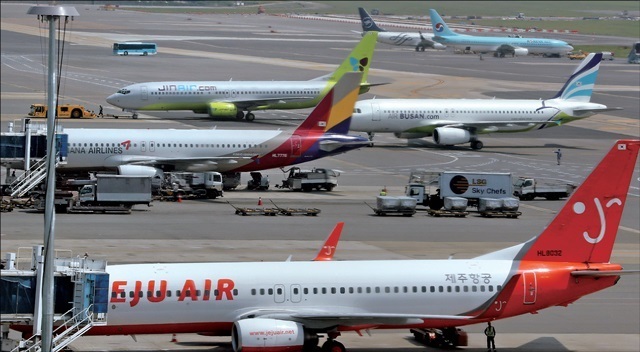 |
Planes from low-cost carriers are on the ground at Gimpo Airport in Seoul. (Yonhap) |
South Korea's air passenger traffic plunged 68 percent last year in the face of the coronavirus pandemic, the transport ministry said Sunday.
In 2020, the number of passengers on domestic and international routes fell to 39.4 million from 123.3 million a year earlier as countries strengthened entry restrictions to stem the spread of COVID-19, the Ministry of Land, Infrastructure and Transport said in a statement.
In particular, the number of passengers on international routes plummeted 84 percent to 14.2 million last year from 90.4 million the previous year, it said.
The government will continue to support domestic airlines as the coronavirus remains a major woe for the airline industry this year, the ministry said.
Local airlines have suspended most of their international routes since early last year as travel demand dried up amid virus fears.
The country's two full-service carriers -- Korean Air Lines Co. and Asiana Airlines Inc. -- focused on winning cargo deals to offset dried-up travel demand last year.
To ride out the unprecedented pandemic, Korean Air put up its non-core assets for sale to secure operating capital and began to carry cargo in cargo seat bags, which attach to the seats of passenger jets.
The move is in line with global peers that are now using their passenger planes for cargo flights, either by using cargo seat bags or removing seats.
But low-cost carriers, such as Jin Air Co., Jeju Air Co., Air Busan Co., Air Seoul Inc., Eastar Jet and T'way Air Co., have had more difficult times as they rely on passenger travel demand. (Yonhap)








